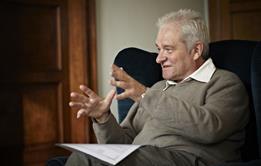The world is changing at an unprecedented speed. Computing power is constantly multiplying and our capacity for data-capture, storage and processing is gigantic.
Google has calculated that from the dawn of time to 2003 there was a total of 1 billion gigabytes of data. Today, there is at least 1 billion every two days. The mobile phone has gone from 12 million users in 1990 to 6 billion and 87 per cent global population penetration today, all the time gaining more power in people’s pockets.
As the futurist Ray Kurzweil put it: “A computer that fit inside a building when I was a student now fits in my pocket, and is a thousand times more powerful despite being a million times less expensive.”
‘Technology to digitise human beings and our phyisology in real time using mobile as a platform is rapidly gaining pace’
Technology is transforming almost every aspect of our lives. But healthcare has proved a lagger of technology. This is due partly to the conservative nature of medicine and partly to the time it takes to build the infrastructure for medicine to become a beneficiary. This will soon change.
The technology to digitise human beings and our phyisology in real time using mobile as a platform is rapidly gaining pace. Together with the advances in the sequencing of the human genome, this will have a profound effect on our healthcare.
Making breakthroughs
Take the simplified example of the effect of digitisation on our cars. In the past, vehicles would break down unexpectedly. Now, most car engines are highly computerised, with early warning sensors that pinpoint problems at their initial stages.
The consequences will be profound when the same becomes true in medicine: a shift from emergency to prevention and an explosion of new evidence and data in the hands of our research community.
This is why Sir Paul Nurse is so right that the future will look different from anything we have seen before. The old rules of research are being ripped up and new ones are being written.
‘The future belongs to those who break down institutional barriers and facilitate the brightest and boldest’
Breakthrough research and development is no longer limited to those employed by big institutions. Take Eric Schadt, a first-in-class genetic researcher who set up on his own, buying super cheap, processing power for his research off Amazon, and conducting it via a cloud while he is travelling. He can now compete with scientists at Merck & Co, Novartis and AstraZeneca with their multimillion-pound super computers. Recall the story of Goldcorp president Rob McEwen, who ordered all data about the lucrative Red Lake goldmine to be posted online, and invited scientists and engineers everywhere to submit drilling plans for a reward. The winning entry came from an unknown person in Russia, and unearthed the richest goldmine in the world.
Profound transformation
It was only five years ago that software developers like Microsoft were organised centrally through armies of developers working in huge in-house operating systems with three-year development cycles.
Now Apple allows anyone, anywhere to produce apps and host them from its platform. One of the reasons Microsoft bought five-year old Yammer for $1.6bn recently was its two-to-six approach to software development: never more than two to six developers taking more than two to six weeks to produce an update.
In medical research, too, the future belongs to those who break down institutional barriers and facilitate the brightest and boldest to come up with the best solutions – wherever they may be found. We now have the technological tools to see healthcare transformed in the next decade. They will have a profound effect not just on research but also on models of delivery.
While the model of medicine my generation receives is fundamentally the same as that of my grandparents, my grandchildren will not recognise the healthcare I receive today.
Ali Parsa is chief executive of Circle
Topics
A research engine could drive the NHS to lead the world

Through more open data sharing and by driving clinical trials the NHS can again be the ‘envy of the world’
- 1
- Currently reading
Ali Parsa on technology in healthcare
- 3






























No comments yet